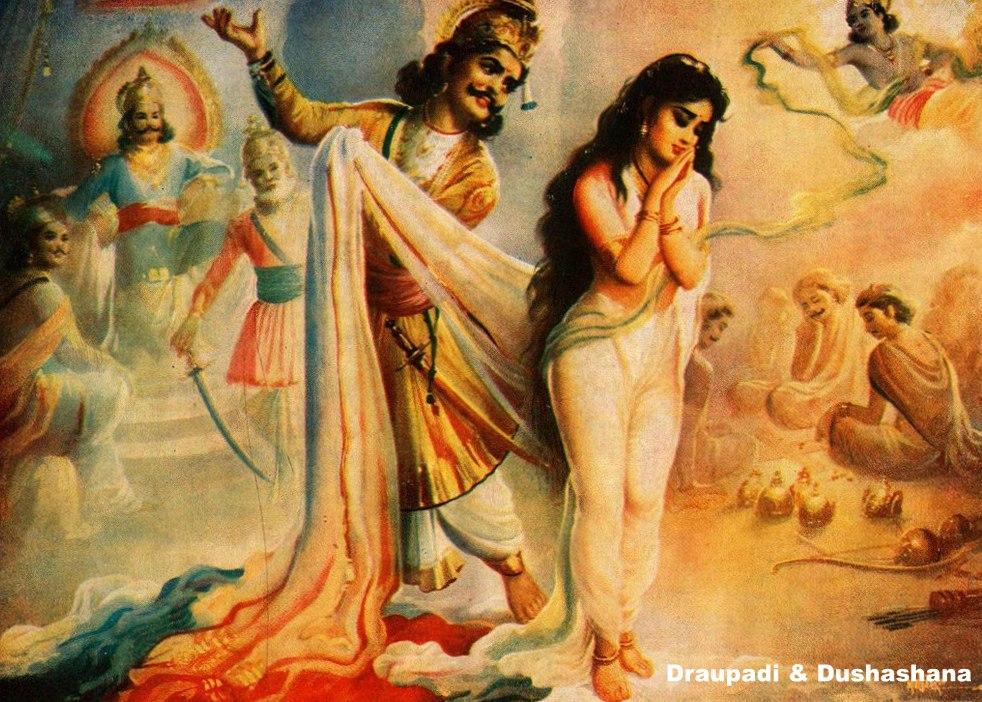 This article recounts the circumstances and events culminating in the Kauravas’ disgraceful disrobing (bastraharan) of Draupadi. After the grand Rajasuya sacrifice, the city of Indraprastha had become incredibly opulent. Its roads, streets, and lanes were regularly sprinkled with perfumed water. The city was adorned with large white mansions lining wide avenues. Jeweled gates and arches stood at the crossroads, and golden water pots were placed at various points. The citizens dressed in colorful silks, adorned with garlands and gold ornaments, felt secure under the rule of the Pandavas. The fame of their opulence attracted kings from other lands who came to pay tribute.
This article recounts the circumstances and events culminating in the Kauravas’ disgraceful disrobing (bastraharan) of Draupadi. After the grand Rajasuya sacrifice, the city of Indraprastha had become incredibly opulent. Its roads, streets, and lanes were regularly sprinkled with perfumed water. The city was adorned with large white mansions lining wide avenues. Jeweled gates and arches stood at the crossroads, and golden water pots were placed at various points. The citizens dressed in colorful silks, adorned with garlands and gold ornaments, felt secure under the rule of the Pandavas. The fame of their opulence attracted kings from other lands who came to pay tribute.
Yudhisthira and his brothers often gathered in the Mayasabha for discussions and spiritual instructions from Brahmins. One day, while listening to ancient Vedic histories, they were interrupted by the arrival of Vidura. Yudhisthira greeted Vidura with respect and concern, as Vidura had always cared for them. Vidura seemed disturbed, and Yudhisthira inquired about the well-being of the king, the obedience of his sons, and the people’s allegiance to the rule.
Vidura revealed that King Dhritarashtra wanted the Pandavas to visit Hastinapura. Duryodhana desired a game of dice with them, pitting Sakuni’s skills against Yudhisthira’s. Although Yudhisthira had reservations, he felt obligated to comply with Dhritarashtra’s request due to his vow to never refuse an elder’s command.
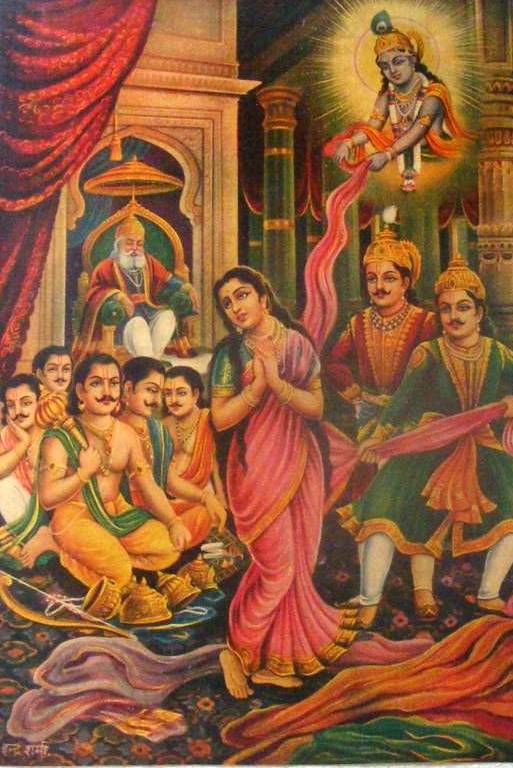
At Hastinapura, in a grand assembly hall, the game of dice began. Yudhisthira, accompanied by his brothers, staked their wealth, horses, chariots, and even their own selves in the game. Despite Yudhisthira’s reservations, Śakuni’s cunning and deceitful tactics allowed him to win every throw, and the Pandavas kept losing their possessions. Vidura, Bhisma, and others present in the assembly were distressed by the unfolding events, but Dhritarashtra remained silent, secretly pleased by his son’s success.
As the Pandavas faced the possibility of losing everything, including themselves, Yudhisthira staked Draupadi as a final bid. Sakuni won her too, and the Pandavas were left in utter despair. Vidura criticized Duryodhana’s actions, warning of the calamities his greed and deceitfulness would bring upon the Kauravas. However, Duryodhana remained unrepentant and even decided to humiliate Draupadi, suggesting she be brought to the assembly and treated as a servant. Vidura condemned Duryodhana’s behavior, but his warnings fell mostly on deaf ears. Yudhisthira remained passive, believing in the course of destiny and submission to authority.
Dushashana drags Draupadi to the assembly
The “pratikamin” (messenger) rushed to the ladies’ chambers where Draupadi resided. He informed her that due to Yudhisthira’s gambling losses, she had been won by Duryodhana and was to be brought to Dhritarashtra’s assembly for some menial work. Draupadi was shocked and questioned the credibility of this claim, wondering how her own husband could have staked her in a gambling match and lost.
Agitated by the news, Draupadi dismissed her maid and asked the messenger to return to the assembly and inquire directly from Yudhisthira whether he had the right to stake her in the first place. The messenger returned and informed Duryodhana about Draupadi’s question. Duryodhana, confident and amused, suggested that Draupadi herself should come and ask Yudhisthira in front of the assembly.
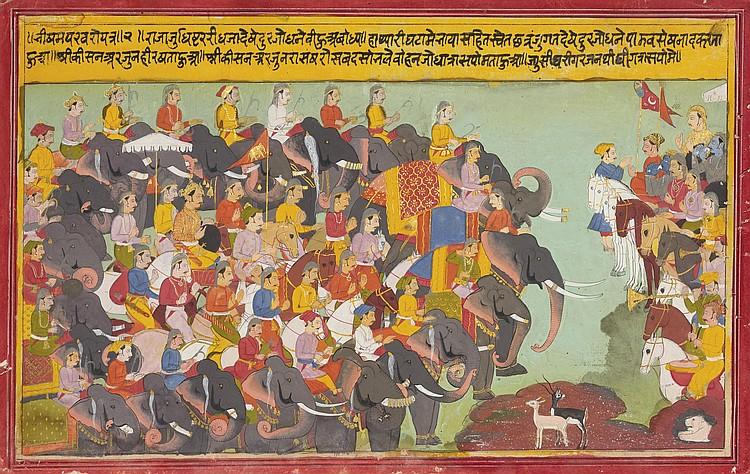
The messenger relayed this to Draupadi, who reacted with compassion and a sense of resignation to fate. She acknowledged that the world’s course was determined by a higher power and expressed her willingness to follow the virtuous path and obey the commands of the moral elders among the Kurus. She urged the messenger to convey her sentiments to the Kuru elders.
The messenger went back to the assembly and shared Draupadi’s response. However, the Kuru elders remained silent, indicating their complicity or lack of intervention in the unfolding events. Duryodhana instructed the messenger to bring Draupadi to the assembly, even if she was in seclusion and dressed modestly.
Amidst the tense atmosphere, the Pandava brothers looked to the Kuru elders for guidance, but their silence was unnerving. Bhima and Arjuna struggled to control their anger and emotions, while Duryodhana reveled in his perceived victory.
Duryodhana commanded the messenger to fetch Draupadi once again. The hesitant messenger feared Draupadi’s anger and questioned what he should tell her. Duryodhana’s brother Dushashana intervened and volunteered to bring Draupadi to the assembly forcefully.
Draupadi emerged from her chamber in distress, weeping, and covering her face. She refused to go before the assembly in her present state of attire, but Dushashana forcefully dragged her into the assembly hall. Draupadi prayed to deities like Krishna and Arjuna for help during this trying moment.
Draupadi was cast before Duryodhana with her clothing in disarray and her hair unkempt due to Dushashana’s rough handling. The assembly witnessed this disgraceful scene, and even stalwart figures like Bhisma, Drona, and Vidura struggled to contain their emotions, weeping openly at the sight.
Draupadi’s Fiery Protest and the Kuru Elders’ Silence
Then, Draupadi rose up like a flame, and her voice resonated with anger as she addressed the assembly. She noted that everyone present was learned in the scriptures and devoted to sacrifice, some even her elders and gurus. She expressed her disbelief at standing before them in her current state and questioned how she could do so. She referred to Yudhisthira as the son of Dharma, bound by subtle rules of morality that only those with clear vision could understand. In her eyes, there was no fault in her husband’s actions.
Draupadi’s tear-filled gaze turned toward Dhritarashtra, and she observed Bhisma, Drona, and Vidura, their faces marked by anguish. Despite her reproach, everyone in the assembly remained silent. She continued, rebuking them for their lack of response to Dushashana dragging her into the hall. She accused them of being of the same mind and condemned their inaction. Draupadi asserted that the high morality of the Kurus had been shattered by this act, and she held the likes of Drona, Bhisma, Kripa, and the king responsible for not condemning the vile deed.
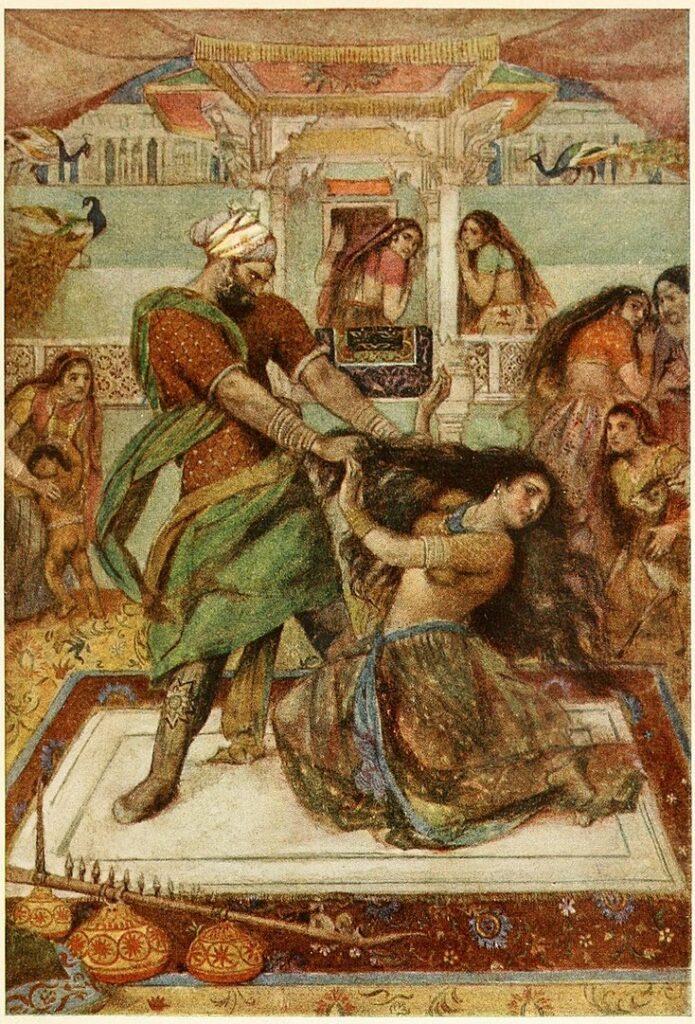
Overwhelmed, Draupadi fell to the hall’s floor, overwhelmed by helplessness and distress. Casting a glance at her infuriated husbands, she saw that her condition further inflamed their anger. Strangely, the loss of their kingdom and wealth paled in comparison to the effect of Draupadi’s gaze, characterized by both modesty and anger.
Dushashana, however, noticed Draupadi’s gaze at her husbands and once more dragged her toward the Kurus. He shouted insults at her, and Duryodhana, Karna, and Sakuni joined in the applause, amused by his actions. Amidst this, the rest of the assembly experienced sorrow witnessing the mistreatment of the princess.
Bhisma, his head shaking, managed to hold back tears and addressed Draupadi. He admitted his inability to answer her point directly, as he grappled with the complexities of morality. Bhisma acknowledged the subtleties of morality and the nuances of the situation, wherein Yudhisthira, while knowing he could lose, still played the fateful game. Bhisma’s gaze shifted to Dhritarashtra, but the king remained silent, offering no response.
Draupadi continued her argument, highlighting that Yudhisthira had been summoned to the assembly by the king and compelled to play against a skilled and deceitful gambler. She emphasized that Yudhisthira’s actions were far from voluntary and accused him of being deprived of his senses by the machinations of sinful men. She implored the elders present to reflect on her words and provide an answer.
In response, Dushashana subjected Draupadi to harsh insults, and she wept bitterly, seeking support from her husbands. Bhima, unable to bear it any longer, expressed his anger to Yudhisthira, criticizing the abominable act of gambling Draupadi. He contemplated burning Yudhisthira’s hands as punishment.
Arjuna, however, intervened, urging Bhima not to succumb to such emotions. He reminded Bhima of his own virtuous nature and the high standards they must uphold, despite the cruelty of their foes. Bhima relented, chastened by Arjuna’s reprimand. The brothers looked at Yudhisthira, understanding the conflict he faced between obeying their elders and addressing the injustice.
Meanwhile, Duryodhana’s laughter echoed, relishing the discomfort of his cousins. He was especially delighted in Draupadi’s distress, recalling her laughter in the Mayasabha.
With her head buried in her hands, Draupadi wept, and her husbands directed furious glares at the insolent Duryodhana. Yet, the Kuru elders remained silent, their lack of intervention casting a heavy shadow over the unfolding drama.
Vikarna’s Bold Stand and Karna’s Defiant Argument: The Debate Over whether Draupadi had indeed been won
Amidst the tense assembly, Vikarna, Dhritarashtra’s son, broke the silence by urging the elders to respond to Draupadi’s question about whether she had actually been won. He emphasized that the matter needed addressing, as failing to do so would lead to their downfall. Despite his plea, the elders, including Dhritarashtra, Bhisma, and Vidura, remained silent. Vikarna criticized their inaction and appealed for an answer.
As the silence continued, Vikarna himself provided an opinion. He declared that Draupadi had not truly been won, citing Yudhisthira’s gambling influenced by sinful tactics. He argued that Yudhisthira played under duress and that Draupadi was staked after he had already lost himself. He highlighted the trio of imperfections within the gambling match: firstly, its impropriety due to Yudhisthira’s contest against a skilled gambler; secondly, Yudhisthira’s initial coercion into the game by his senior figures followed by his escalating involvement beyond reasonable bounds; and lastly, his self-loss preceding any stake, rendering him incapable of wagering Draupadi.Vikarna’s assertion sparked applause from many in the assembly, criticizing Sakuni’s role.
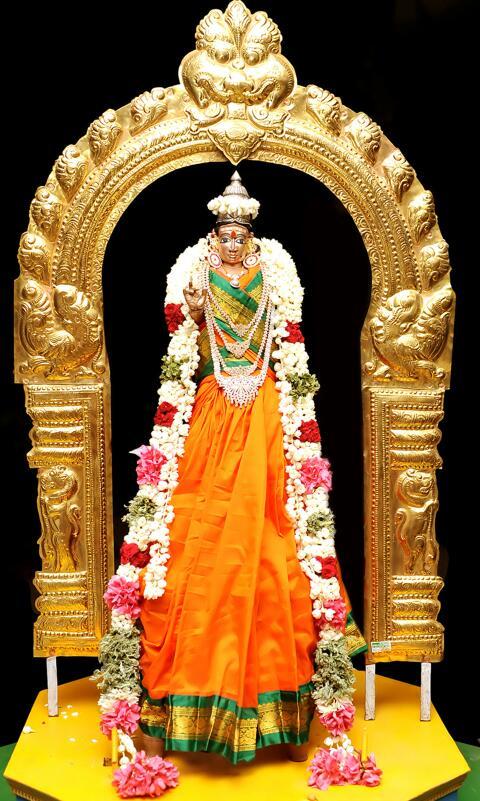
Karna vehemently opposed Vikarna’s stance, insisting that Draupadi had indeed been won fairly. He dismissed Vikarna’s argument as immature and lacking an understanding of morality. Karna drew attention to Draupadi’s polyandrous marriage and labeled her unchaste, using this as a basis to degrade her dignity. He suggested that Draupadi’s clothes be removed, asserting that she now belonged to the Kauravas and that the Pandavas’ royal status was nullified.
Draupadi’s Bastraharan (Disrobement)
Enveloped in a cocoon of morality, the Pandavas embarked upon a somber act. One by one, they deliberately removed their upper garments, a silent yet resonant gesture that resonated with the gravity of the situation. Their discarded clothes lay like fallen banners, marking the arena where their dignity was being contested. In the midst of this tense tableau, Dushashana advanced, a malevolent specter drawn to Draupadi’s distress.
With a deliberate lack of haste, Dushashana’s fingers found the edge of Draupadi’s sari, a fabric woven from threads of her honor and self-respect. He pulled with an inexorable force, an embodiment of the injustice that was transpiring. Draupadi, her grip on the cloth fierce but futile, seemed as fragile as a wisp of smoke against his strength. In a poignant moment of vulnerability, her desperate eyes sought solace among her five husbands, only to realize that even their collective might was impotent against the mightier currents of fate.
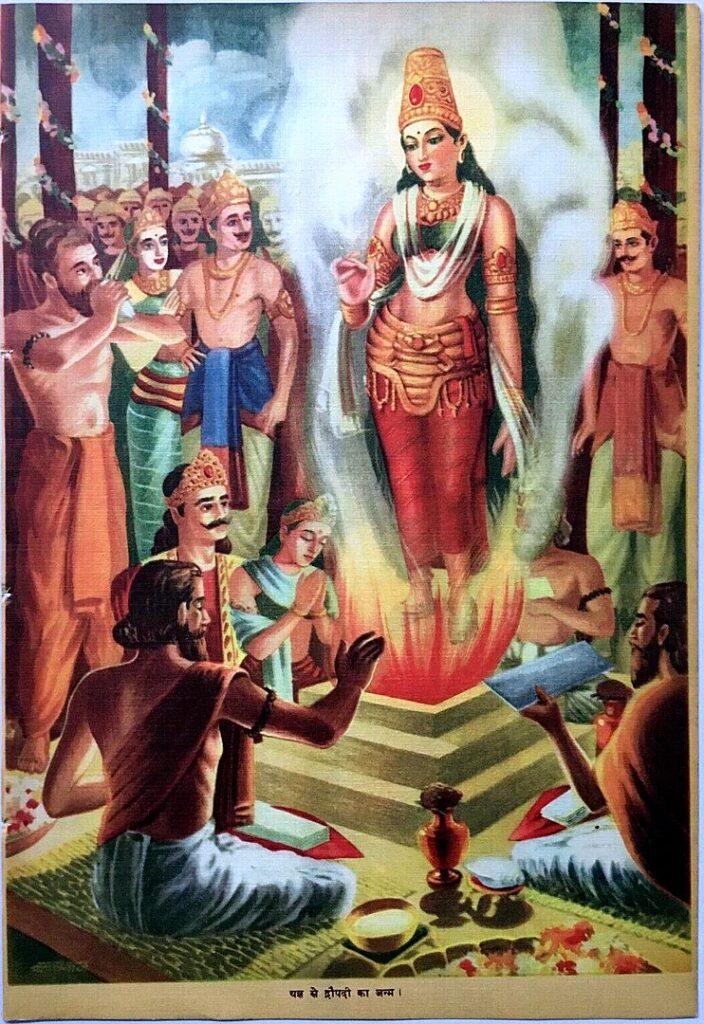
Dushashana’s efforts intensified, a metaphorical storm tearing at Draupadi’s last bastion of modesty. She spun like a trapped animal, her eyes darting around the hall, scanning for a savior. In the midst of the tumult, her thoughts found refuge in the one she considered her ultimate protector: Krishna. In her heart’s cry, her voice cracked and soared, invoking the myriad names of the divine, words laced with desperation and devotion. “O Govinda! O Keshava! O beloved of the gopis and Lord of Vrndavana! O Janardana, You are the destroyer of all affliction. I am sinking into the Kuru ocean. O Lord, O soul of the universe, O creator of the world! Save me who am distressed and losing my senses in this evil assembly!”
From the distant expanse of Dwaraka, the reverberations of Draupadi’s anguish reached Krishna’s ears. A symphony of divine compassion played within Him, prompting His unparalleled mystic power to unfurl. Swiftly, seamlessly, He traversed the realms to stand, imperceptible yet omnipresent, in the very heart of Hastinapura’s assembly hall. There, in the crosshairs of malevolent intent, Draupadi’s plight became His own.
As Dushashana’s exertions escalated, an astounding metamorphosis seized the scene. The fabric that seemed finite was unbounded, a paradoxical river of cloth flowing endlessly from Draupadi’s attire. In an almost surreal spectacle, the very essence of her modesty refused to yield, as if a higher decree dictated its preservation. The mound of cloth that gathered at her feet seemed a silent monument to the resilience of honor against indignity. Unseen by mortal eyes, Krishna extended a limitless expanse of cloth to shield Draupadi’s dignity. Dushashana, driven by his cruel determination, persisted in yanking at her sari. With each pull, Draupadi twirled like a dancer, her movements a defiant expression of her spirit. Yet, despite his relentless efforts, the intricate layers of her attire held steadfast, refusing to relinquish their sanctity.
The witnesses to this miraculous resistance found themselves transported beyond the mere realm of spectacle. An outpouring of astonishment mingled with admiration for Draupadi’s unwavering spirit, while Dushashana, sweat-soaked and defeated, embodied the very darkness he sought to unleash.
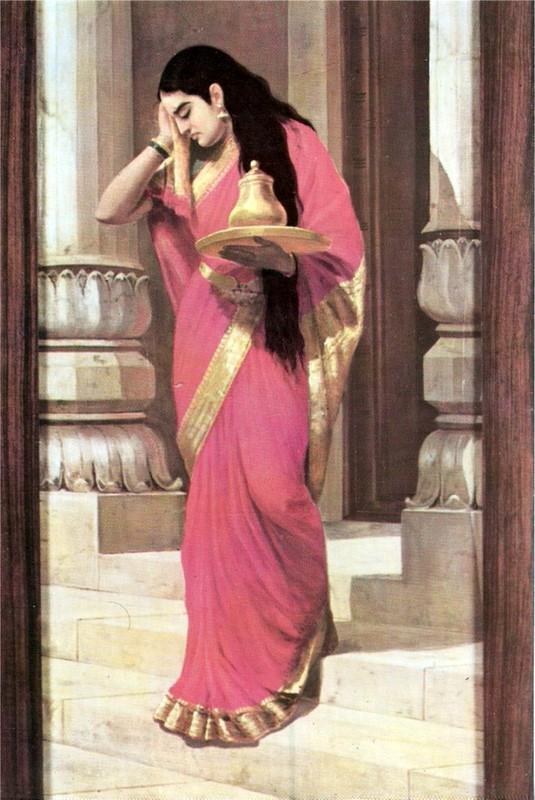
Bhima, a force of nature fueled by a warrior’s fury, sprang to his feet. His voice, a booming testament of conviction, reverberated through the hall. “O kings of the world,” he roared, a proclamation as steadfast as the mountains, “listen to my words! I shall now make a vow unlike any that has been made before. Nor shall such a vow be made in future. If I do not forcefully tear open the breast of this sinful wretch Dushashana on the battlefield and drink his blood, then may I not obtain the path of my ancestors.”
The air hung heavy with the weight of Bhima’s oath, a promise woven from wrath and sorrow. The assembly echoed with a cacophony of applause, the applause of those who acknowledged the justice of a brother’s retribution and censured the transgressor. A wave of indignation surged, a tide of voices demanding an end to the desecration. In the chorus of condemnation, the walls of the assembly hall trembled, bearing witness to a moment where honor faced off against degradation, and the tides of history swayed in uncertainty.
Dhritarashtra’s Intervention and Draupadi’s Wise Appeals
Ultimately, Dhritarashtra recognized that the situation had spiraled beyond control, prompting him to break his prolonged silence. With a raised hand, he quelled the turmoil that had engulfed the assembly hall due to ominous signs. Addressing Duryodhana, he denounced his actions and cautioned that by insulting Draupadi, he had essentially sealed his own fate. The blind king comprehended the impending peril – the Pandavas, in alliance with the indomitable Krishna, posed an imminent threat to the Kauravas. In an effort to mend the damage, Dhritarashtra sought to console Draupadi, extending his willingness to grant her a favor. Despite the gravity of the situation, Draupadi recognized her chance to set things right. Respectfully, she implored the king to release Yudhisthira from bondage, highlighting his paternal role in her son Prativindya’s life. The request aimed to restore Prativindya’s rightful status as a prince rather than being treated as a slave’s offspring.
Dhritarashtra yielded, granting the first favor without hesitation, and then offered her the opportunity to ask for a second boon. Draupadi capitalized on this by requesting the freedom of Bhima, Arjuna, and the twin brothers, along with the return of their chariots and weaponry. Once more, Dhritarashtra complied with her plea promptly. Pressed for a third boon, Draupadi, aware of the limits prescribed by tradition, wisely refrained. She emphasized that the pursuit of excessive desires could erode virtue, and she expressed confidence that her husbands, once liberated, would secure their prosperity through virtuous deeds.
Lessons from the Episode: Draupadi’s Unyielding Spirit and Krishna’s Miraculous Intervention
The poignant episode of Draupadi’s fervent plea to Lord Krishna, culminating in her miraculous salvation, has been enshrined within the annals of the bhakti tradition. This legacy reverberates through the intricate tapestry of architecture, resonates in the cadence of literature, comes alive in the vivid hues of poetry and imagery, finds resonance in the rhythms of prayer and song.
While Krishna’s ethereal intervention casts a luminous hue upon the incident, it’s imperative not to overshadow the unwavering mettle that Draupadi consistently displays throughout. Her character stands as a testament to fortitude, a resolute embodiment of spirituality. This bedrock of devotion underpins her resolute demeanor, reaching its zenith in her plea of helplessness to Krishna and his subsequent miraculous deliverance.
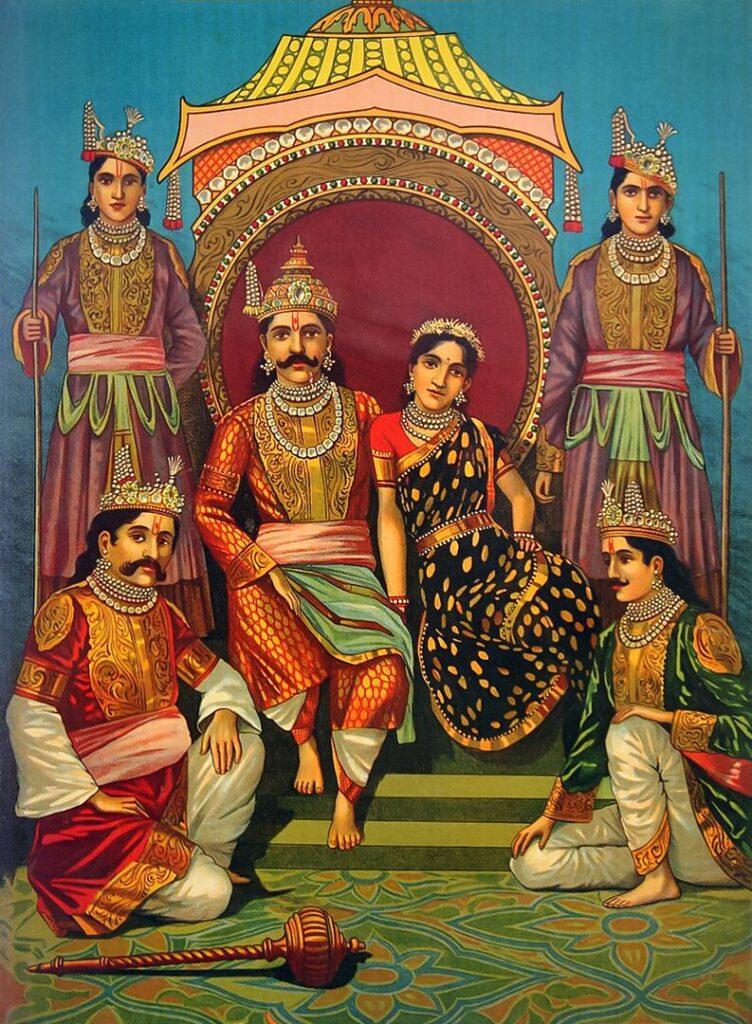
Although Draupadi’s mystical rescue at the hands of Krishna tends to capture the limelight, another facet of equal, if not greater, significance is her enduring tenacity. Such mystical intercession isn’t always at hand for those faced with threat or dishonor. What truly redeems Draupadi is not solely the otherworldly rescue, but her unswerving determination across the narrative. Within the delicate confines of her feminine form courses an unyielding backbone, steadfastly erect. This unwavering resolve serves as an aspirational beacon, radiating the potential for all women, and indeed for all of humanity, to emulate—irrespective of the indignities the world might thrust upon us.